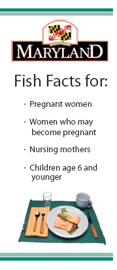|
Click on photo to view larger image


|
According to a Virginia Polytechnic Institute and State University study, the vast majority of local Baltimore Harbor area recreational fishermen are highly aware of existing fish consumption guidelines. This is partly due to MDE’s boost in fish advisory outreach efforts this past year. By posting signs at public fishing sites, providing guidelines on MDE’s website, and distributing fish consumption brochures with specific health information, MDE contributed to this significant increase in public awareness.
In 2005, MDE and the Maryland Women, Infants & Children (WIC) Program at the Department of Health and Mental Hygiene prepared a simplified informational brochure entitled: “Fish Facts for Pregnant Women, Women Who May Become Pregnant, Nursing Mothers, and Children Age 6 and Younger.” The new brochure contains national recommendations relating to commercial fish from U.S. EPA/FDA and local specifics for recreationally caught fish from Maryland waters. The brochure is published in English and Spanish and distributed to the general public, fishermen at Baltimore Harbor fishing locations, and new or expectant mothers visiting WIC clinics and other county health outlets throughout Maryland.
“In spite of our outreach, a large portion of the population interviewed for the study does not follow the guidelines and consumes white perch and catfish more frequently than recommended,” said Rich Eskin, Director of Technical and Regulatory Services Administration. "Also, a large portion of those who eat crabs caught in Baltimore Harbor consume crab mustard, which goes against Baltimore Harbor recommendations. MDE will continue its outreach efforts to inform the public about contaminated fish and seafood consumption risks."
To protect the public, MDE monitors Maryland’s recreational fish, targeting both game fish (largemouth bass, stripped bass, white perch) and bottom-feeding species (catfish). Using this information, MDE issues fish consumption guidelines for particular fish species from specific locations. This information is made available to the public on the MDE Fish Advisory website (http://mde.maryland.gov/programs/Marylander/fishandshellfish/Pages/
fishconsumptionadvisory.aspx/) and is included in the guidebook provided upon purchase of a recreational fishing license.
To obtain a copy of the new brochure or for more information about Maryland fish consumption advice, visit MDE's Fish Advisory website (http://mde.maryland.gov/programs/Marylander/fishandshellfish/Pages/
fishconsumptionadvisory.aspx) or call MDE at 410-537-3906. Nationwide fish consumption advisory information is available at: www.epa.gov/ostwater/fish/. Virginia Polytechnic Institute and State University study can be obtained at:
www.cmiweb.org/human/CBP_fishadvisory04.html
|
Take Home Points About Healthy Fish Consumption:
-
Follow MDE meal guidelines – you can find these online (www.mde.state.md.us/fishadvisory/) or by calling 410-537-3906
-
Eat smaller fish
-
Mix the types of fish you eat
-
Avoid eating crab “mustard”
-
To decrease your exposure to PCB’s follow these steps (Note: these steps do not reduce mercury):
-
Eat only the fillet portion of the fish - cut off skin and fat
-
Bake, grill, or broil your fish on a rack letting the fat drip off
-
Do not batter or bread fish before cooking |
|